September 29, 2023
Rereading The Millstone
My official origin story as a Margaret Drabble devotee begins with the battered paperback copy of The Radiant Way I picked up from an Osaka bookshop back in in 2004, and fell in love with, and how I spend the new couple of years reading through her entire backlist (as well as new releases like The Sea Lady, The Red Queen, and The Dark Flood Rises). In 2020, I ventured to go back and reread all her novels in order, but the plan fast sputtered out because earliest Drabble was never my favourite anyway—I found the preoccupations of her characters terribly unfashionable, or perhaps it was just my ancient Penguin paperbacks. I reread the first two and then no more, until I partook to reread The Radiant Way again last winter, and found the reading experience just as glorious as it as twenty years ago (and the book somehow even more timely). And then, not long after, I reread A Natural Curiosity, which I didn’t love as much, but that was a high bar, and now I’ve gone and just reread Drabble’s third novel, The Millstone, after listening to a discussion about it on the Backlisted podcast, and now I want to get to Jerusalem the Golden next, so it seems I’m rereading them these books after all, just a little bit out of order.
My TRUE origin story as a Margaret Drabble devotee is a little bit different from that, however, as Drabble’s The Millstone was actually the first Drabble I ever read, before I even knew what a Margaret Drabble was. I even vividly recall reading it in late December 2001, the week between Christmas and New Year, back at my student apartment in Toronto, which was quiet because my roommates had not returned from their holidays. My elderly paperback (more about that in a moment) purchased for $3.00 at a secondhand store (likely Eliot’s on Yonge Street) because “Margaret Drabble” was a name I vaguely recognized, and because I’d started to realize how I’d wasted all my idle time in my undergraduate years reading writers called Thomas, and D.H., and F. Scott, and Ernest (and Morley and Robertson), and (apart from two ubiquitous Canadian examples) almost nobody with a name like “Margaret” at all.
And I am not sure that anybody has ever missed the point of a novel at all as I missed the point of The Millstone in 2001, but I am refusing to take full responsibility for this, and perhaps you’ll agree that I shouldn’t when I tell you about the particular edition of the novel I was reading, which wasn’t called The Millstone, or even A Touch of Love (which had been the title of the film based on the novel), but instead Thank You All Very Much, which had been the US title of the film, and the cover is atrocious, depicting nothing like anything that happens in the novel at all (and I actually I think that all of these titles are terrible).
The cover wasn’t even the worst of it though, instead the back cover copy, which I’ve pasted below. Clearly, someone else HAD missed the point of this novel as much as I had, which was whoever was employed to write the jacket copy. Clearly they didn’t quite know how to market this book, first published in 1965, about a young intellectual woman who becomes pregnant and opts to raise her child, to find herself and her place as a woman in society as a mother (but, most essentially, as nobody’s wife). But here’s how they put it on the back of my book, all of which describes the first 5 or so pages of the book, and no more, and also seems to be about another character altogether:
The Reluctant Virgin
Rosamund was a very now girl. She liked Fellini movies, underground novels, and more than one boyfriend at a time. Yet she was guilty of the most unpardonable twentieth-century sin: virginity.
Something had to be done.
But the more she didn’t do it, the more she read and heard about how she ought to do it. And when she finally did do it…she got caught.
So can you blame more for finding this novel remarkably unfashionable? A bit weird? What is my fault, however, is that I never made the connection that the only reason this whole plot takes place at all (and seems so old fashioned) is because it’s set in the 1960s, when abortion was illegal in Britain. Along similar lines, when I ended up pregnant by accident myself just a handful of months later (which I hadn’t seen coming in December, the tail end of a long era in which I’d be quizzed about sexual partners while donating blood, and just laugh and laugh) and had an abortion, it never occurred me that it hadn’t even been fifteen years since Canadian women had gained the right to abortion access. I was still very young, and to come of age in the 1990s in the western world was to see one’s own experience as outside of history.
I also think that I was too young and unschooled/earnest to realize just how funny this novel was, how ironic. Lines like, “My attempts at anything other than my work have always been abortive. My attempt at abortion, for instance, must be a quite classic illustration of something: of myself, if of nothing else.” Rosamund buys a bottle of gin with the plan to drink it to end her pregnancy, but then her friends come over and drink it all, and then (a bit drunk) she elects to take a very hot bath, but the gas heater didn’t work properly and she couldn’t get the temperature right, and the water ends up being freezing. Maybe I just didn’t go in for abortion humour in quite the same way in 2001.
I was also too young to fully get the meaning of a paragraph like this (and Drabble’s sentences are hard to parse! There are some parts I still don’t understand right now: “At times I had a vague and complicated sense that this pregnancy had been sent to me in order to reveal to me a scheme of things totally different from the scheme which I inhabited, totally removed from academic enthusiasms, social consciousness, etiolated undefined emotional connections, and the exercise of free will. It was as though for too long I had been living in one way, on one plane, and the way I had ignored had been forced thus abruptly and violently to assert itself. Really, it was a question of free will; up to this point in my life I had always had the illusion at least of choice and now for the first time I seemed to become aware of the operation of forces not totally explicable, and not therefore necessarily blinder, smaller, less kind or more ignorant than myself.”
The Millstone is not “old fashioned” (though the cover and copy surely are!), but instead a literary artifact of a particular moment in history, and a very social kind of novel too about class and gender, and the lives of educated women, and socialized medicine, and learning that one possesses a body, that one is a woman after all, and what that means, and all the other people such a distinction connects one to. (It’s also a terrifically funny novel about the literary scene, onto which Rosamund is an observer, as several of her friends are novelists, and the petty rivalries of that scene rang very true for me and made me feel better about my own plentiful foibles and insecurities.) I also now see that this book is beginning of my very favourite part of the Drabble canon, which is women who revel in the chaos of motherhood but who aren’t wives—Rosamund is a foremother of Liz Headleand and Kate Armstrong for sure. I also love that there are whole passages on jigsaw puzzles, which Rosamund takes up to pass the time and calm her brain, which I wouldn’t have noticed when I read this book in 2001, but Margaret Drabble hadn’t written her jigsaw puzzle memoir The Pattern in the Carpet then.
Though I must have reread this book at least once before, an experience of which I have no memory, and—unlike in 2001—there is no date on the inside page, but there instead a conspicuous bracket on page 97, on which Rosamund considers how—as an unmarried mother—nobody ever dares to say to her, “I bet you wouldn’t be without her now.” A paragraph that would have sang to me after my first child was born, words that reflected my truth: “And in many ways I thought that I would prefer to be without her, as one might reasonably prefer to lack beauty, or intelligence or riches or any other such sources of mixed blessing and pain. Things about live with a baby drove me into frenzies of weeping several times a week, and not only having milk on my clean jerseys. As so often in life, it was impossible to choose, even theoretically, between advantage and disadvantage, between profit and loss: I was up quite unmistakably against No Choice.”
Not old fashioned at all, I suppose, but instead a message from my future!
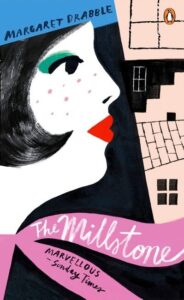
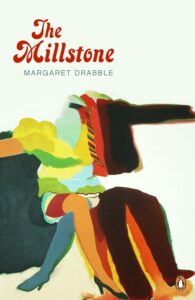
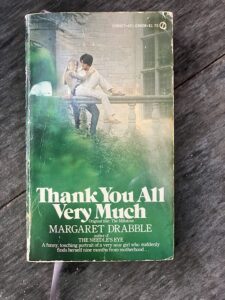
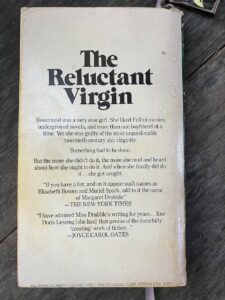
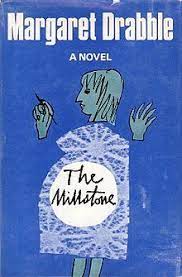
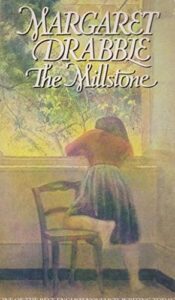
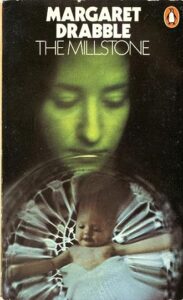
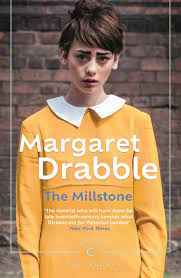






Oh my goodness! In reading your plot synopsis just now, I realize that I read this as a teenager !! and was similarly puzzled as to all her dramatic abortion attempts (I was thinking all the while, “why didn’t she just got to the doctor?” in my naïveté and 1980s teenage-hood not ever considering that abortion had ever been illegal. Or that it might be, again).
I LOVE The Millstone, and have been meaning to reread it. This has given me a nudge. Thanks for your thoughtful thoughts, as always! And my lord — that cover and title that you originally had. 😱